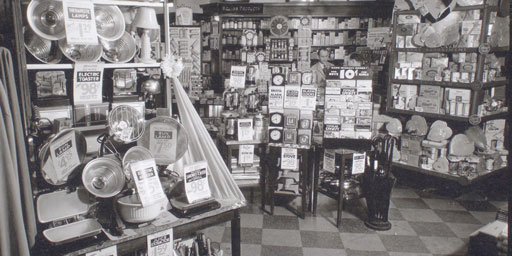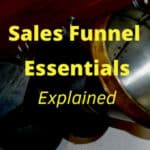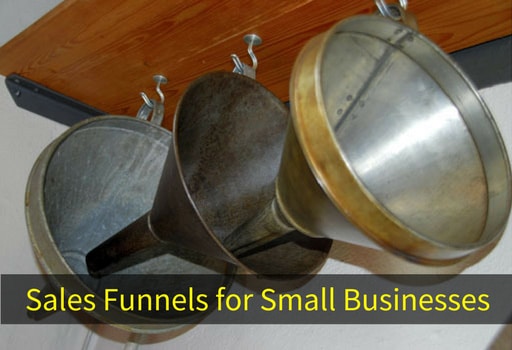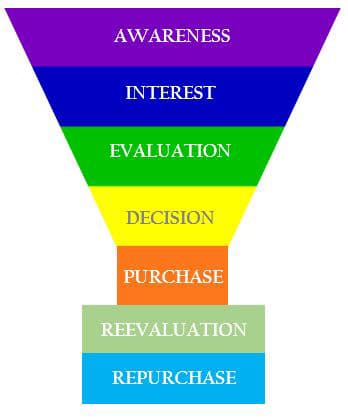If you have paid any attention to how other businesses and startups are promoting themselves, you may have noticed they share some similar practices.
These include branded marketing materials, Facebook ads, Google Ads, blog posts, eBooks, infographics, and a myriad of other types of content.
The purpose of that content is to arm their audience with all the information they need to make a Yes decision.
However, these marketing pieces don’t just stem from good hunches or intuition. There’s an underlying process, called a sales funnel, at work.
Many businesses and startups employ this methodology to ensure they are not only connecting with the right people, but also connecting at the right time.
What are sales funnels?
Simply put, a sales funnel is the representation of the buying stages your prospects filter through until they make their purchase decision.
The whole purpose behind creating this funnel is to anticipate what your customers are thinking during the process, and what you can expect them to do next.
But why a funnel, you ask?
There’s an actual reason for this: You will not experience a 100% closing rate. (If you do, make sure you share your secret to success with us.)
Starting at the beginning of the sales process, or the top of the funnel, you will have a number of prospects interested in your product or service. But as they continue to learn and discover the solutions you provide, only a fraction of those initial prospects will trickle down to the next stage of the sales cycle. And only a few of those will continue to the next stage. And so on, until you reach the closing stage.
The funnel analogy gives you a realistic visual, as you typically lose potential sales the closer you get to closing. Logically speaking, you wouldn’t have more prospects in Stage 4 than you did in Stage 3, etc.
As you are probably aware, your prospects follow a process that helps them to discover your product, understand what it can do for them, and decide if it’s worth their investment. Your business sales funnels serve to mirror their decision-making experience by understanding their thoughts, hesitations, interests, and questions, and then leading them to solutions via relevant content.
Dissecting the Sales Funnel
Every business sales funnel is unique to the business it serves, but each one tends to share some of the same characteristics. Let’s break down some of these commonalities:
Stage #1 – The Awareness Stage
Sometimes referred to as the discovery stage, your customers in this phase will first learn that there is a solution to whatever problem they are trying to solve. At this point, they may or may not know about your company or what you offer.
This stage is where brand promotion comes in handy to make people aware that your company exists.
Stage #2 – The Interest Stage
Once a prospect learns about a particular solution, they actively set out to find the solution in the Interest Stage. They might stumble across your company as they are searching for a particular solution similar to what you offer, or they might already know about the products or services you offer.
In this stage, brand promotion and product or service advertisements are helpful. You might create a social media campaign that describes what you offer.
Stage #3 – The Evaluation Stage
At this point there stands a good chance that your prospects are comparing multiple companies’ products and services.
If they have managed to reach this stage, it’s a good possibility that they are going to make a decision with someone, so it’s crucial that you nurture this stage carefully to ensure you present the best solution for them.
This stage is where you want to talk competitive advantages. Think case studies, blogs, or eBooks that position you as an industry leader. You could also offer a free trial here.
Stage #4 – The Sales Funnel Decision Stage
By now you know they are interested in your product or service, and now it’s a matter of deciding which solution you presented will best fit their needs. This is typically where you will settle on things like price, contract agreements, etc.
This stage is a fragile one, as a customer who has decided they want to do business with you might still bail if you can’t agree on terms and conditions.
At this point you might offer a coupon, free trial, or discount.
Stage #5 – The Sales Funnel Purchase Stage
The sale is done – time to celebrate your win! Once your customer inks the deal and hands over the funds, Stage 5 is considered complete.

Bonus Sales Funnel Stages
Focusing on “one and done” deals isn’t sustainable for most small businesses, especially considering it costs around five times more to sell to a new client than an existing one. It’s crucial that you also build these “bonus stages” into your small business sales funnels to keep your funnels (and bank account) full:
Stage #6 – Sales Funnel Reevaluation Stage
If you have contracts renewing, or if you sell products that customers will typically need to reorder, you need to focus on how to resell your products or services to customers who already know your company.
Selling to a familiar face is a bit different than someone who has zero experience with your startup or small business, as you don’t have to spend as much time explaining what you do or how your company can provide solutions.
However, it’s still important to remind customers why you are the better choice, as you never know if your competition has tried to lure your customers away from you. It’s also a good opportunity for upselling or highlighting new products and services you’ve added since their last purchase.
You should also continue to stay top of mind by sending out emails, announcements, coupons, and helpful resources.
Stage #7 – Sales Funnel Repurchase Stage
Now your goal is to get them to continue being your customer. They might renew a contract, renegotiate terms, or switch to a different plan. Once they sign a new agreement or make another purchase, consider this stage complete.
How to Build Successful Sales Funnels
The biggest consideration in building successful sales funnels for startups or small businesses is first understanding your ideal customer. This can be especially tricky for startups, as you might not always recognize what your target audience looks like.
The Ideal Customer
To get started in defining your ideal customer ask yourself the following questions:
- Who am I selling to? Consider a variety of demographics, like age, job title, gender, location, etc., then craft a few buyer personas to help establish the sales process.
- What problems does my solution alleviate? In other words, think of why someone would want to buy your product or service.
- What roadblocks will my prospects encounter in making a decision? Is someone other than the decision maker responsible for the initial research? Are their budget constraints? Do they have a projected timeline for implementation of your product?
- What does my customer need to know to make a decision? What research do you think they will do regarding your solution? What questions do you think they will ask?
- How long might it take for them to make a decision? Some sales cycles are longer than others. You don’t want to give up too early, nor do you want to chase them for months if they aren’t truly interested to begin with.
- How do my prospects like to communicate? Do they prefer you to call their office or mobile number? Do they check email frequently? Are they on social media? You may encounter a variety of preferences, so be prepared with tactics to satisfy each one.
It also helps to start with the end in mind. Think of what you want your final result to be (some form of sale, right?). From there, craft a strategy that will help your prospects reach that end result.
If you sell a variety of products and services, you may find that having separate sales funnels for each will prove beneficial. Make sure your startup business sales funnel or small business sales funnel reflects the product(s) you’re selling, not just a generic out-of-the-box sales funnel that follows all the steps.
Sales Funnels Paths
To wrap up, a sales funnel is simply a natural decision-making path the buyer takes to discover solutions to their problems and decide if yours will meet their needs. Sales funnels for startups and sales funnels for businesses each target the buyer depending on their stage in the process by providing relevant content to aid their decisions.
And when you do it right, you might just see some extra light at the end of your funnel.
HANDPICKED RELATED CONTENT
Selling on Amazon – 9 Planning Tips
Measuring Your Business Web Presence – 7 Reasons You Should


